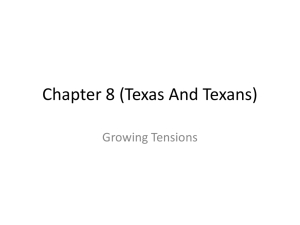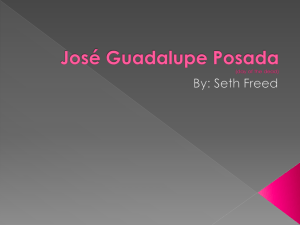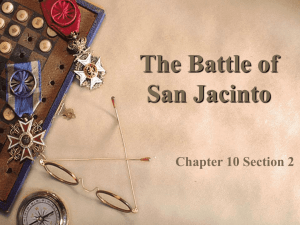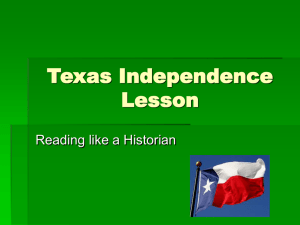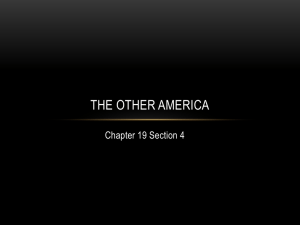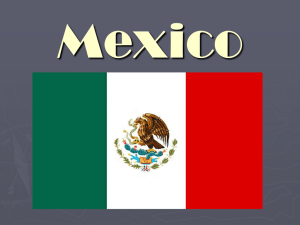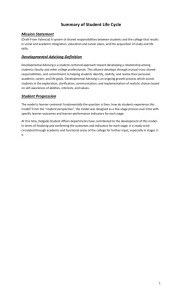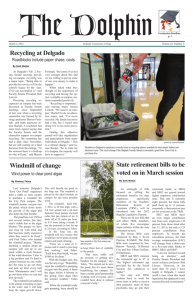A Mexican Account of San Jacinto (1836)
advertisement
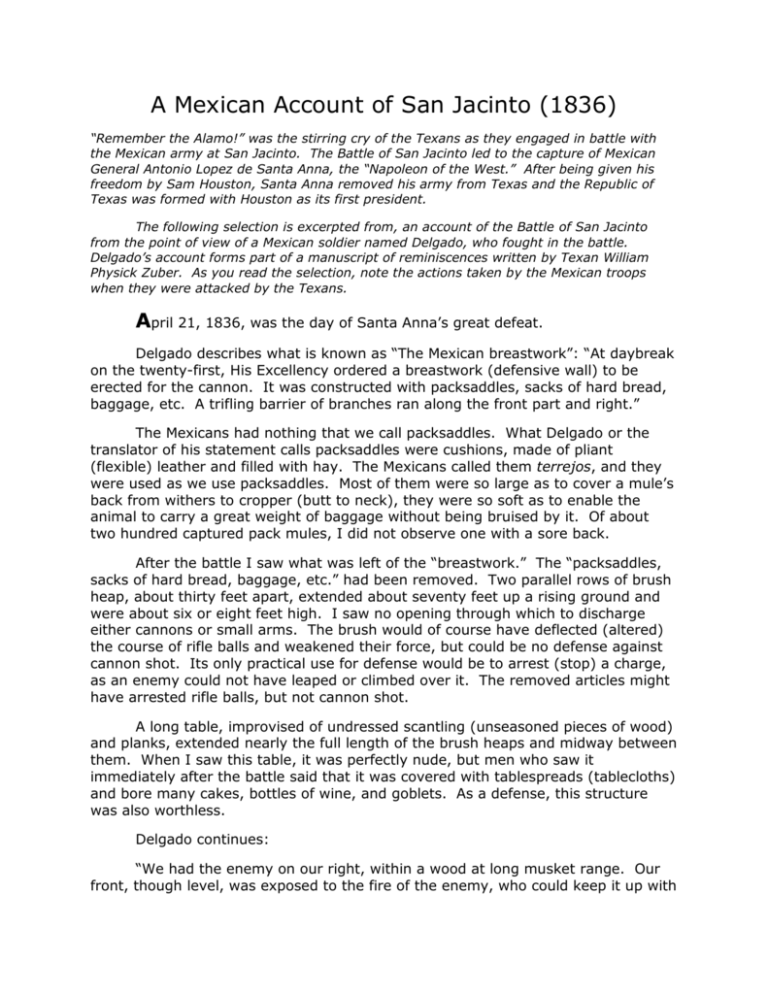
A Mexican Account of San Jacinto (1836) “Remember the Alamo!” was the stirring cry of the Texans as they engaged in battle with the Mexican army at San Jacinto. The Battle of San Jacinto led to the capture of Mexican General Antonio Lopez de Santa Anna, the “Napoleon of the West.” After being given his freedom by Sam Houston, Santa Anna removed his army from Texas and the Republic of Texas was formed with Houston as its first president. The following selection is excerpted from, an account of the Battle of San Jacinto from the point of view of a Mexican soldier named Delgado, who fought in the battle. Delgado’s account forms part of a manuscript of reminiscences written by Texan William Physick Zuber. As you read the selection, note the actions taken by the Mexican troops when they were attacked by the Texans. April 21, 1836, was the day of Santa Anna’s great defeat. Delgado describes what is known as “The Mexican breastwork”: “At daybreak on the twenty-first, His Excellency ordered a breastwork (defensive wall) to be erected for the cannon. It was constructed with packsaddles, sacks of hard bread, baggage, etc. A trifling barrier of branches ran along the front part and right.” The Mexicans had nothing that we call packsaddles. What Delgado or the translator of his statement calls packsaddles were cushions, made of pliant (flexible) leather and filled with hay. The Mexicans called them terrejos, and they were used as we use packsaddles. Most of them were so large as to cover a mule’s back from withers to cropper (butt to neck), they were so soft as to enable the animal to carry a great weight of baggage without being bruised by it. Of about two hundred captured pack mules, I did not observe one with a sore back. After the battle I saw what was left of the “breastwork.” The “packsaddles, sacks of hard bread, baggage, etc.” had been removed. Two parallel rows of brush heap, about thirty feet apart, extended about seventy feet up a rising ground and were about six or eight feet high. I saw no opening through which to discharge either cannons or small arms. The brush would of course have deflected (altered) the course of rifle balls and weakened their force, but could be no defense against cannon shot. Its only practical use for defense would be to arrest (stop) a charge, as an enemy could not have leaped or climbed over it. The removed articles might have arrested rifle balls, but not cannon shot. A long table, improvised of undressed scantling (unseasoned pieces of wood) and planks, extended nearly the full length of the brush heaps and midway between them. When I saw this table, it was perfectly nude, but men who saw it immediately after the battle said that it was covered with tablespreads (tablecloths) and bore many cakes, bottles of wine, and goblets. As a defense, this structure was also worthless. Delgado continues: “We had the enemy on our right, within a wood at long musket range. Our front, though level, was exposed to the fire of the enemy, who could keep it up with impunity (freedom from harm) from his sheltered position. Retreat was easy for him in his rear and right, while our troops had no room for maneuvering. We had, in our rear, a small grove extending to the bay shore, and to New Washington…. “A few hours before the engagement, I submitted to General Castrillon a few remarks on the situation, suggested by my limited knowledge. But he answered, ‘What can I do, my friend? I know it well, but cannot help it. You know that nothing avails here against the caprice, arbitrary will, and ignorance of that man.’ This was said in an impassioned (emotional) voice, in close proximity to His Excellency’s tent. “At nine o’clock AM General Cos came in with reinforcement of about five hundred men,. His arrival was greeted with a roll of drums and with joyful shouts. As it was reported to His Excellence that these men had not slept the night before, he instructed them to stack their arms, to remove their accoutrements (equipment), and go to sleep in the adjoining grove. “No important incident took place until 4:30 PM – At this fatal moment, the bugler on our right sounded the advance of the enemy upon that wing. His Excellence and staff were asleep; the greater part of the men were also sleeping; of the rest, some were eating, others were scattered in the woods in search of boughs to prepare shelter. Our line was composed of musket stacks. Our cavalry were riding bareback, to and from water. “I stepped upon an ammunition box, the better to observe the movements of the enemy. I saw that their formation was a mere line in one rank and very extended. In the center was the Texas flag, on both wings they had two cannons, well manned. Their cavalry was opposite to our front, overlapping our left. “In this disposition, yelling furiously, with brisk fire of grape, musketry, and rifles, they advanced resolutely (boldly) upon our camp. There the utmost confusion prevailed. General Castrillon shouted on one side. On the other, Colonel Almonte was giving orders. Some cried out to commence firing. Others, to lie down to avoid grapeshot. Among the latter was His Excellency. “Then, already some of our men were flying in groups, terrified, sheltering themselves behind large trees. I endeavored to force some of them to fight, but all efforts were vain – the evil was beyond remedy. They were a bewildered and panic-stricken herd. “The enemy kept up a brisk crossfire upon the woods. Presently, we heard, in close proximity, the unpleasant noise of their clamor. Meeting no resistance, they dashed upon our deserted camp. “Then I saw his Excellency running about in the utmost excitement, wringing his hands, and unable to give an order. General Castrillon was stretched on the ground, wounded in the leg. Colonel Trevino was killed, and Colonel Marcial Aguirre was seriously injured…. “Everything being lost, I went, leading my horse, which I could not mount because of the firing had rendered him restless and fractious (irritable), to join our men still hoping that we might be able to defend ourselves, or to retire under shadow of the night. This, however could not be done. It is a known fact that Mexican soldiers, once demoralized, cannot be controlled unless they are thoroughly trained to war. “On our left, and about a musket shot from our camp, was a small grove on the bay shore. Our disbanded herd rushed for it, to obtain shelter from the horrid slaughter carried on all over the prairie by those bloodthirsty usurpers (invaders). Unfortunately, we met on our way an obstacle difficult to overcome. It was a bayou (creek), not very wide, but rather deep. The men, on reaching it, would helplessly crowd together, and were shot down by the enemy, who was close enough not to miss his aim. It was here that the greatest carnage (destruction) took place. “Upon reaching that spot, I saw Colonel Almonte swimming across the bayou with his left hand, and holding up the right, in which he grasped his sword. “I stated before that I was leading my horse, but, in that critical situation, I vaulted upon him, and with two leaps, he landed me on the opposite side of the bayou. To my sorrow, I had to leave that noble animal mired in that place, …As I dismounted, I sank in the mud waist deep, and had great trouble to get out by taking hold of the grass. Both my shoes remained in the bayou. I made an effort to recover them, but soon came to the conclusion that, did I tarry (linger) there, a rifle ball would certainly make an outlet for my soul, as had happened to many a poor fellow around me. Thus I made for the grove, barefooted. “There I met a number of other officers, with whom I wandered at random, buried in gloomy thoughts upon our tragic disaster. We still had a hope of rallying some of our men, but it was impossible. The enemy’s cavalry surrounded the grove, while his infantry penetrated it, pursuing us with fierce and bloodthirsty feelings. “There they killed Colonel Batres, and it would have been all over with us had not providence placed us in the hands of that noble and generous captain of cavalry Allen, who, by great exertion, saved us repeatedly from being slaughtered by the drunken and infuriated volunteers. “Then they marched us to their camp. I was barefooted. The prairie had been burned up, and the blades of grass, hardened by fire, penetrated like needles the soles of my feet, so that I could scarcely walk. That did not prevent them from striking me with the butt ends of their guns because I did not wlak as fast as they wanted. “At last, we reached the camp. We were seated on the ground by twos, as we had marched. On the bay shore, our thirst had been quenched with an abundance of water which Allen and others had allowed to pass from hand until all were satisfied…. “After having kept us sitting about an hour and a half, they marched us to the woods, where we saw an immense fire, made up of a huge pile of wood, even whole trees being used. I and some of my comrades were silly enough to believe that we were to be burned alive, in retaliation for those who had been burned in the Alamo….We were considerably relieved when they placed us around the fire to warm ourselves, and dry our clothes….. The battle rages on. The surrender and sentencing of Santa Anna On a separate piece of paper, answer the following questions in complete sentences, using blue or black ink and legible penmanship! Please write the question and answers in separate colors of ink. In parentheses is the value of that particular question. 1. 2. 3. 4. 5. 6. 7. 8. 9. What was the battle cry for the Texans? (1) What was General Santa Anna’s nickname? (1) What is a “breastwork” and what is the purpose of one? (2) According to Delgado, what did he first try to do when the Texas troops advanced into the Mexican camp? How did the Mexican troops respond to Delgado’s actions? (2) Who was General Castrillon talking about when he said “…caprice, arbitrary will, and ignorance of that man”? (1) Why do you think Delgado felt that the Texans were “drunken and infuriated volunteers”? (1) Explain why it was so difficult for the Mexican soldiers to get away. (2) Why did Delgado and his comrades believe that they were going to be burned alive by the Texans? What was the real reason for the fire? (2) Using your historical imagination, do you think a Texas soldier writing an account of the battle would describe the Texans in the same way they were described by Delgado? Give reasons for your answer (3)
